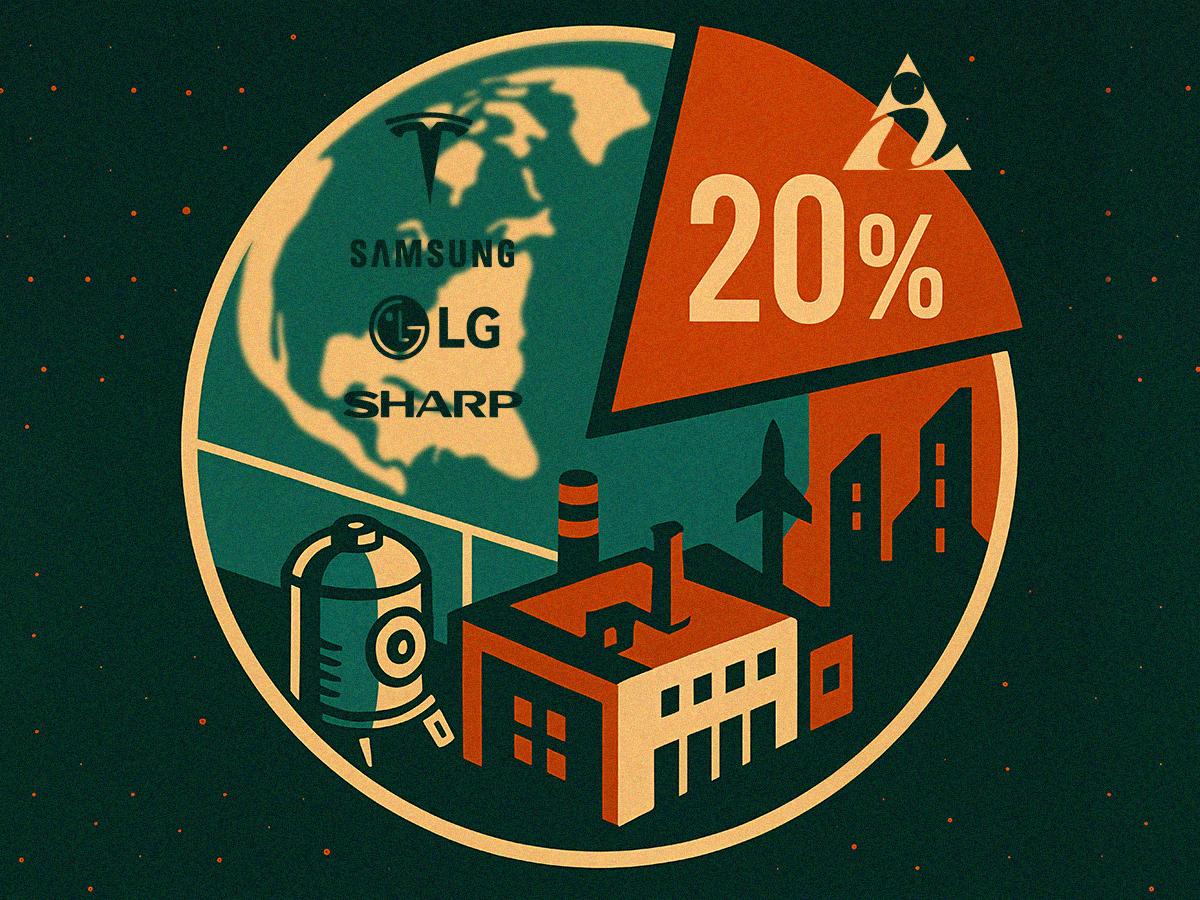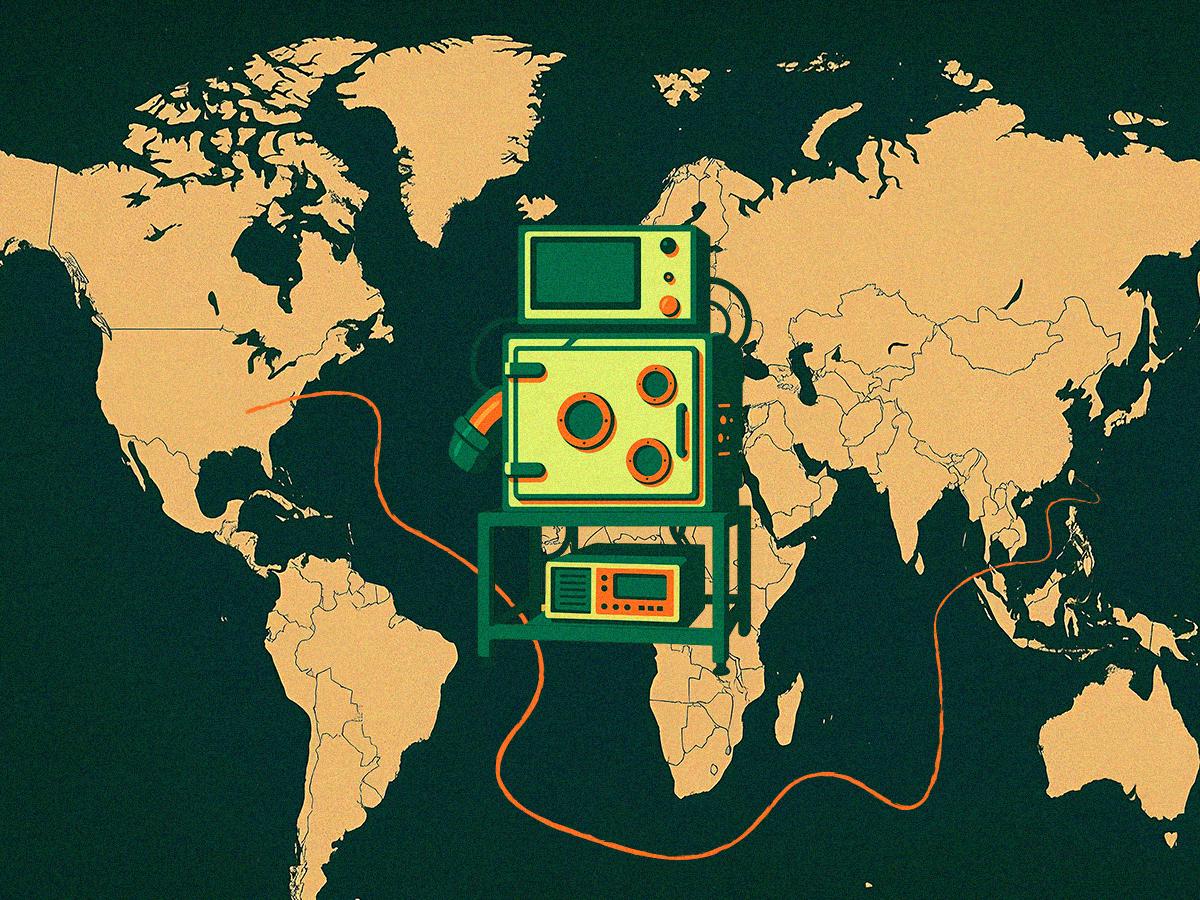The investigation was conducted in collaboration with the non-profit organization on global security C4ADS, the publications "Important Stories," 15min.lt, and “Skhemy,” a project of Radio Liberty Ukraine, and supported by Cyberpartisans.
Innovation without ovation
The company Izovaс is little known to the general public, despite its 30-year history and a client base that includes technological giants. The enterprise specializes in vacuum technologies and, according to co-founder Vladimir Shiripov, has been involved in the production of Apple products: its equipment was used to apply a protective layer to the screens of the early, cathode-ray tube iMac all-in-one computers. According to a World Bank report, about half of the touch screens for iPhone and iPad were originally manufactured using Izovaс's equipment.
"When you tap with your finger and the phone knows where you pressed, it's this touchscreen, specifically this trace — which includes Izovaс's trace," said Vitali Khomich, deputy director of the group of companies, in an interview four years ago.
According to a report published by the World Bank in 2020, the company held approximately 20% of the global market share in supplying vacuum deposition equipment for touchscreens. In addition to Apple, Izovaс named among its clients major global brands such as Tesla, Samsung, LG, Sharp, and others.
The Belarusian innovative company started in 1992 as a scientific and technical firm, founded by the Minsk Radiotechnical Institute and several of its alumni. Now Izovac is owned by three of them - Vladimir Shiripov, Mikalai Leuchuk, and Sergey Maryshev. The name of the company stands for "inventions in a vacuum."
Gradually, Izovac transitioned to assembling production lines for clients. The enterprise expanded and developed a diversified structure: it would develop a technology, nurture it for a while, and then spin it off into a separate company.
One of them is the Belarusian company COOO Izotek-M. Its role within the group of companies is mechanical processing and manufacturing of optical elements. And with this company, our investigation into the darker side of Belarusian business begins.
To Russia with tech…
In December 2023, Izotek-M sold a used plasma etching system of the American brand Applied Materials to the Russian company NM-Tech LLC, according to customs data obtained by BIC. This type of equipment is used for producing microchips, a vital and scarce component in Russia's military technology. We've covered this twice: in investigations about how Belarus sells Western microchips to Russia circumventing sanctions, and how the state enterprise Integral assists the Kremlin in warfare. [*]
Supplies of such American equipment as a plasma etching system to Russia are prohibited by US export control rules. The restrictions also apply to those units that were used in third countries before being sent to Russia.
"US sanctions and US export control rules cover used items. [...] [They] cover items whether or not they’re going through intermediaries or whether or not they’re going directly from US companies. And it’s the responsibility of US companies to ensure that the end users are who they say they will be," said Richard Nephew, Senior Research Scholar at Columbia University in an interview with BIC.
NM-Tech — the recipient of the equipment in the mentioned customs data — was sanctioned by the US and EU at the start of the full-scale invasion. Indeed, not for cooperation with the defense industry, but for ties with government structures - specifically, the Russian Vnesheconombank (since late 2018 - VEB.RF). NM-Tech is the technological successor of the microchip manufacturer Angstrem-T, which went bankrupt in 2019 after failing to repay VEB.RF's loan for factory modernization. The sole owner of NM-Tech both at the time of founding and as of December 31, 2024, is VEB.RF. [*]
The Russian special economic zones' website states that the company is focused on "supplying the civilian market with cutting-edge electronic components." However, by January 2024, NM-Tech had expanded its extensive operations to include the production of weapons and ammunition. [*] [*]
So, how did an American machine for manufacturing microchips end up with this company, bypassing dual sanction restrictions? A BIC correspondent sought to uncover the answer to this question in Taiwan.
... through the Silk Road ...
In Taipei, the capital of the island state known as the Republic of China, a co-owner of Izotek-M has been registered. The Taiwanese company More Tech International Corporation jointly owns it with the Belarusian Izovac. [*] [*]
In the Taipei office of More Tech International Corporation, a journalist from BIC managed to meet with their manager named Saul Lin. Posing as a potential client, the investigator inquired about the company's dealings with the Russian company NM-Tech.
"You also work with a company NM-Tech?" asked our correspondent.
"Yes, before," replied Saul Lin.
"Before? Not anymore?"
"No, but the... But one project."
Next, the BIC journalist asked for assistance in supplying a prohibited American machine to Belarus, similar to the one Izotek-M delivered to NM-Tech. Lin responded that getting a new one is impossible, but he added that he has a partner in China who could help procure a used one.
"Okay, with the Chinese partners, how would it work? I write to you what we need and then you deal with the Chinese partners or you put us in touch with the Chinese partners?"
"I am gonna see what kind of equipment and then [decide]. … we can see if we can do it for you or not. Chinese friends".
Acting on a tip that the American equipment could have reached Russia from China, BIC investigators indeed found such a shipment in databases of Chinese foreign trade operations. In December 2023, the Belarusian company Izotek-M received an Amat Centura SuperE machine from Hong Kong-based Smart Kit Technology Limited, which is now under US sanctions. The same shipment also appeared in Russian customs records. A third confirmation was provided by our partners — the non-profit global security organization C4ADS. In the same month, Izotek-M sold a unit of the same model and weight to Russian NM-Tech. Only $600,000 more expensive: bought in China for $3.6 million, and sold for $4.2 million. BIC has no evidence that Saul Lin or the Taiwanese company were involved in organizing this specific shipment. Izotek-M's director, Pavel Paliashchuk, declined to speak with BIC upon learning that the media is not registered in Belarus.
From November 2022 to December 2023, Izotek-M presumably supplied goods worth approximately $6 million to NM-Tech, according to data provided to the BIC by an industry source. But that's just the tip of the iceberg.
...to the Russian military-industrial complex...
An intermediary in the deal between NM-Tech and Izotek-M was the Russian company OOO Inzhiniring Grupp. In the first two years of full-scale war, this company presumably received over $100 million from NM-Tech, according to documents obtained by BIC from a source in the Russian tax service. The firm not only helped NM-Tech set up chip and microchip production but also trained employees to operate the supplied equipment.
The latest invoice between the two companies, available to BIC, was paid in July 2024, and in August, Inzhiniring Grupp fell under US sanctions.
Among the clients of Inzhiniring Grupp, we discovered more than 30 companies connected to the Russian defense industry. Almost all of them are under sanctions from the European Union, the United States, and other Western countries. Seventeen of them are part of Rostec, Russia's largest arms manufacturer. This state corporation accounts for half of all Russian defense contracts. Customers of Inzhiniring Grupp produce, for example, strike drones Orion, onboard systems for aircraft and helicopters involved in the war against Ukraine, and guidance systems for Kalibr cruise missiles.
In the first two years of the war, Russia launched 843 such missiles against Ukraine. The deadliest attacks occurred in 2022: on March 1, Kalibr missiles killed 44 people in Kharkiv, on March 18, over 100 soldiers in Mykolaiv, and on July 14, 29 people in Vinnytsia, with another 200 injured.
Over the three years of full-scale war, Inzhiniring Grupp received over $180 million from enterprises linked to the Russian military-industrial complex.
In 2023-2024, Inzhiniring Grupp also presumably imported sanctioned goods worth at least $32 million, according to customs data.
This machinery was manufactured in the USA, Japan, Germany, the Netherlands, and South Korea. Among the largest purchases were plasma etching systems similar to those produced by Applied Materials, as well as other equipment for processing semiconductor materials.
Inzhiniring Grupp attracted BIC's attention not only through its ties to the Russian defense industry. The owner of the company since April 2022 is Belarusian Sergey Yanovich. [*] [*] According to Cyberpartisans, Yanovich concurrently worked for Belarusian Izovac at least until 2024. [*] Until June 2023, Inzhiniring Grupp was named Izovac Inzhiniring. On its website, it stated that it was the official representative of Izovac in Russia, and the director of the Russian company used an email address with the izovac.com domain at least until 2024. [*] [*]
There are at least four legal entities tied to the group Izovac registered in Belarus:
OOO Izovac, СOOO Izotek-M, which supplied equipment for microchip production to Russia, as well as OOO InterNanoTechnologii and OOO Doprealnost. Associated with the group, there are company structures abroad: in Russia, there is OOO Inzhiniring Grupp; in Lithuania and Germany, I-Photonics; and in Taiwan, a company referred to by its owners as either Izovac Taiwan or Green Sputtering. Documents from the Taiwanese registry indicate that initially it was named Green Sputtering, later renamed to Green Science. [*]
Before the war, the names of Russian and Lithuanian firms included the name "Izovac" (Izovac Engineering and Izovac Photonics), but after Russia's full-scale war against Ukraine began, both underwent rebranding and severed ties with Izovac. At least in their names.
Izovac is owned by three Belarusians. The largest share (56.7%) belongs to Vladimir Shiripov, a candidate of science engineering and co-author of patents, including display touchscreen glass. Mikalai Leuchuk owns 24.5% of the company, while Sergei Maryshev owns 18.8%. [*] [*]
The same shares are held by all three in InterNanoTechnologii as well. [*] [*]
Isotek-M, which sold the equipment to Russia, is half-owned by Izovac and half by the Taiwanese More Tech International Corporation.
Among the clients of other group companies — InterNanoTechnologii and Izovac — BIC identified at least 30 Russian military-industrial enterprises in the customs data obtained by the editorial team. Twenty-two of them are under Western sanctions. From 2022 to 2024, these two Belarusian companies delivered nearly $10 million in supplies to their wartime partners. This follows from the analysis of the customs data obtained by BIC. It showed that the vast majority of the delivered components were labeled as made in Belarus.
The equipment that Izovac and InterNanoTechnologii delivered to Russian companies plays a vital role in military production, said Olena Bilousova, an expert from the Kyiv School of Economics, in an interview with BIC and the "Skhemy" project.
"Supplying such equipment is prohibited. This is very important because it's this access [to purchases] that allows Russia to create new capabilities, meaning expanding production and acquiring new equipment that enables it to produce more weapons ... The dual-use aspect is very fragile here because there are very few non-military purposes that require such precise equipment."
BIC found out that Izovac had collaborated with Russian defense enterprises even before Russia's first invasion of Ukraine.
In a commercial released in 2012, a business proposal for supplying equipment to the Novosibirsk Instrument-Making Plant is shown. Since the end of 2023, this enterprise has been under U.S. sanctions as one of the key producers of optics for the Armed Forces and the FSB of Russia. A year later, Izovac published a video showing two copies of the Federal Directories of the Russian Defense Industrial Complex.
"Today, we are engaged in the production of equipment designed to apply optical coatings for various customer requirements. These products are then used in the military-industrial complex, for example, in laser optics, night vision devices, and various applications in both civilian and defense industries," explains Vladislav Rodionov, an employee of Izovac, in the video.
Since the onset of the full-scale war, Izovac's revenue has doubled each year: in 2021, it was 13 million Belarusian rubles ($5.1 million), in 2022, 27 million ($10.3 million), and in 2023, 53 million ($17.7 million). In 2024, the company's revenue grew by 36% to 72 million ($22.2 million). [*]
Since Russia’s full-scale invasion of Ukraine, five companies within the Izovac group presumably received around $200 million from contracts with enterprises involved in the Russian military industry. This is based on BIC’s calculations, which rely on obtained data regarding Belarusian export shipments and money transfers from Russian companies.
Meanwhile, companies with at least indirect connections to Izovac continue to earn revenue in the European Union.
... to the European Union.
At the time of publication, the Izovac company website, izovac.com, is not operational. The last time we were able to access izovac.com was on April 7 — at that time and previously, users were automatically redirected from it to the portal i-photonics.lt. It is owned by the eponymous Lithuanian company. Previously, it was called Izovac Photonics.
The Lithuanian I-Photonics has a namesake in Germany: I-Photonics Germany GmbH. They share the same owners: Evgeniy Shiripov, Andrei Levchuk, and Yauhen Khakhlou. They are the sons of the founders of the Belarusian Izovac.
BIC was informed by two sources familiar with the operations of the latter that there are no ties between Lithuanian I-Photonics and the Izovac group. According to one of them, employees of the Lithuanian company are even prohibited from responding to messages from their Belarusian colleagues: "Apparently, someone has forbidden it to avoid tarnishing their reputation in Europe."
A journalist from the Lithuanian publication 15min.lt, posing as a client, spoke with Vitali Khomich, the director of Lithuanian I-Photonics. The top manager assured the interviewer that his companies have no ties with Russia: "Much of what we do, of course, we sell for export. But primarily, it's Europe, the USA, Canada. We have many projects with Taiwan and Korea. As for the East — no. We do not work with our eastern neighbors. Part of our team once left there [from Russia], and we closed all business with them back in 2021."
We found links between the Lithuanian and Belarusian firms even after 2021. According to the Unified State Register, Evgeniy Shiripov, Andrei Levchuk, and Yeugen Khakhlou were simultaneously owners of I-Photonics and founders of Izovac until December 2022. Together, they owned 43% of the company. However, their connections can be traced beyond that: they worked in the Belarusian companies of the group at least until September 2024, according to data from the Social Protection Fund of Belarus database provided by Cyber Partisans.
The current director of I-Photonics, Vitaly Khomich, was, at least in 2020, the deputy director of Izovac — a Belarusian company within the group. Additionally, according to data from the Cyber Partisans, there are records of social security contributions (FSZN) from Izovac on behalf of Khomich up until September 2024. [*]
Vitaly Khomich disputes the Cyber Partisans’ claims. "This is impossible because we all left the company. I moved here (to Lithuania — editor's note) in October 2021," Khomich stated in an official interview with journalists from 15min.lt. However, when the Lithuanian journalists asked the director of I-Photonics to show his employment record book with an official termination entry from Izovak, he said he did not have it. Khomich noted that it might still be with his previous employer.
In addition to shared managers and owners, the Lithuanian and Belarusian companies are linked by similar logos and identical products. On its website, I-Photonics offers vacuum systems Ortus, Lidiz, Aurora, and Meridian, which are registered trademarks of Izovac.
Frozen tranche
In April 2022, Lithuania's Financial Crime Investigation Service seized €1.2 million from I-Photonics' account. The reason was that this money had been transferred from a company associated with Russian citizen Sergey Chemezov, who is on the EU sanctions list.
Sergey Chemezov is the head of the Rostec corporation, a member of the bureau of the Supreme Council of the United Russia party, and a figure close to Putin since their joint service at the KGB's Dresden residency.
In 2022, when I-Photonics received the transfer, the company was named Izovac Photonics. It was renamed only on December 27, 2022. Khomich explained that after the war began, the Lithuanian company decided to urgently withdraw money from the account of the Russian company. Therefore, the payment was sent in the form of a credit agreement — this was "the fastest way to transfer money." As clarified by the Lithuanian company, "no one planned to repay this credit or make any payments to Russia." After the account was seized, I-Photonics filed a lawsuit seeking the return of €1.2 million. In December 2024, the Regional Administrative Court dismissed the company's complaint as unfounded, but I-Photonics filed an appeal, according to the Lithuanian Financial Crime Investigation Service, which spoke to BIC and the news outlet 15min.lt.
This transfer was supposed to be received from Izovac Inzhiniring, Khomich clarified. According to him, this company is a separate entity that does not fall under Izovac. The decision to transfer the funds, which Lithuania later froze, was made by Yauhen Khakhlou on the very first day of Russia's full-scale invasion of Ukraine. At the time of the transaction, he was heading the Belarusian company Izovac and was also one of the co-owners of I-Photonics. He discussed this in an interview with 15min.lt.
The BIC discovered a similar bank transfer in data obtained from a source in the Russian tax service. According to this information, Izovac Inzhiniring indeed sent I-Photonics $1.3 million on February 25, 2022. [*]
In Lithuania, there are mechanisms to monitor companies associated with Belarus and Russia, which at the same time position themselves as independent, but these should be adjusted, Laurynas Kasčiūnas, the vice-chairman of the Lithuanian Seimas Committee on National Security and Defense, told 15min.lt.
"They should be reviewed to determine whether such a company can operate in Lithuania at all — especially considering information about its connections with the Russian defense sector. For my part, I will certainly do everything possible as a member of parliament to approach the relevant institutions and ask them to reconsider whether such a company has the right to operate in Lithuania," he added.
The BIC sent inquiries to the international partners of the Izovac group, as well as to the companies in the group and their owners. At the time of publishing the investigation, we had not received any responses. Vladimir Shiripov, one of the founders of Izovac, and Sergey Yanovich, the owner of Inzhiniring Grupp, refused to speak with the BIC.






